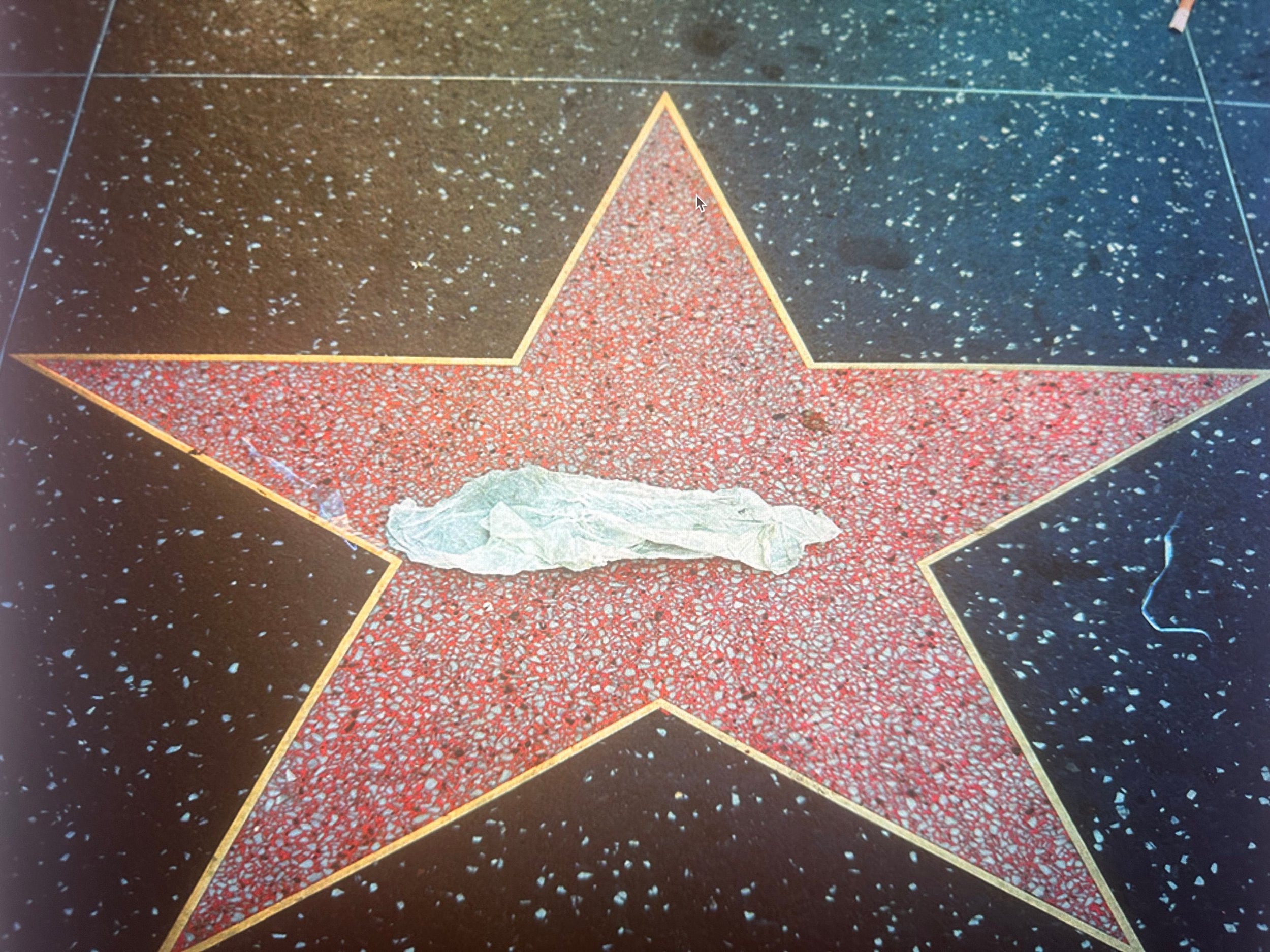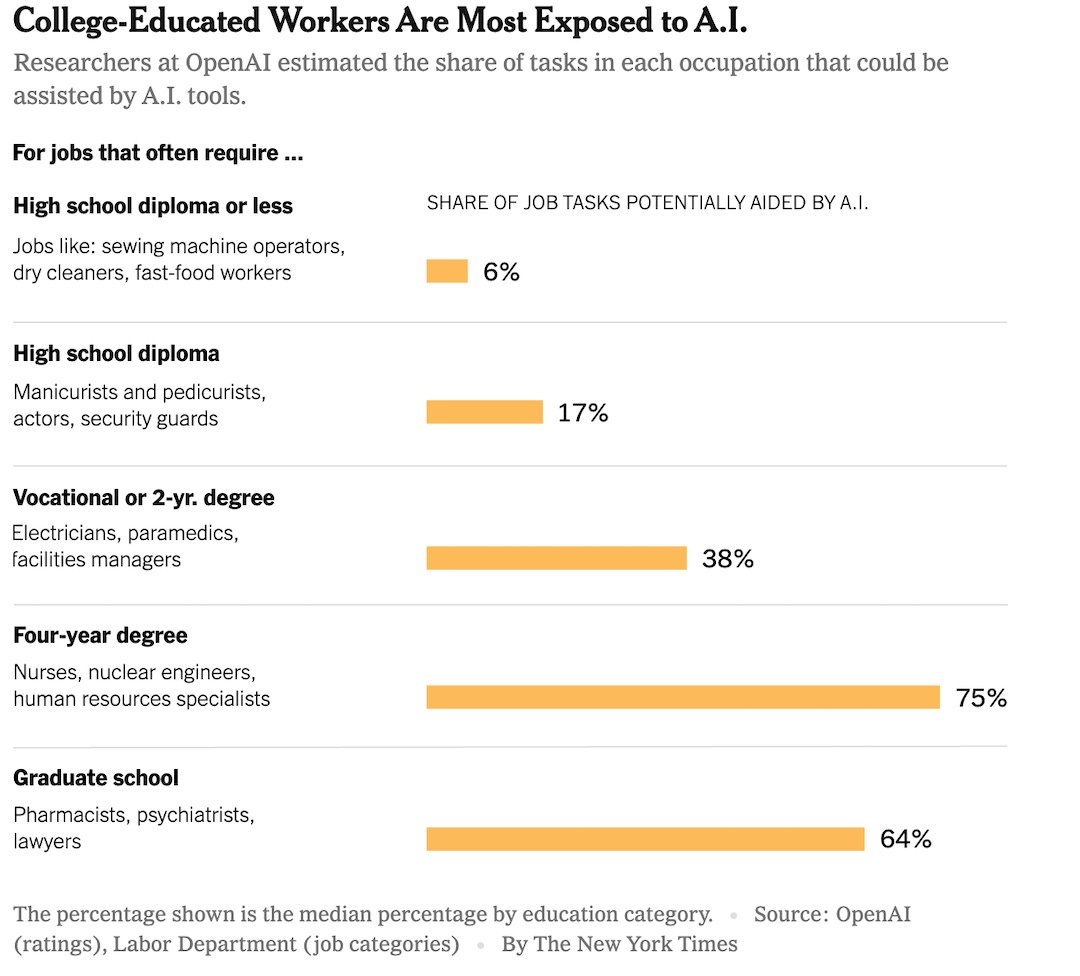Chance.
Whenever anyone asks me for career advice, regardless of their age or industry or challenge, I ask them to read a piece I wrote a couple of years ago called 12 Career Lessons (it is second most popular post in over three years of writing this thought letter after Re-Thinking Presentations)
12 Career Lessons distills everything I have learned after a 40 year career. Many then ask and want to hear the story behind these lessons.
10 years ago the Chicago Ad Federation gave me their highest honor which is like a life time achievement award and my acceptance speech called “Chances” is what I share with those who want to understand the messiness but most importantly the help and luck one needs in any career. I have republished below for those interested:
In every life, and a career is just a part of life, chance plays a very big role. Luck matters. Some believe things are destined and “it is written” while others like TE Lawrence in Lawrence of Arabia believes “nothing is written.” But regardless luck and chance play a big role in life.
It is not this chance that I would like to speak about but rather about the chances that people took and the chances people have given me over the years without which I would not be here.
Let me start in the middle or at the beginning of my US life where the Graduate School of Business at The University of Chicago (now the Booth School) gave me a chance to be part of a world class university by admitting me with no work experience and an okay GMAT score. I was only one of two people from India admitted that year, 1980, and one of a handful from outside the United States. ( 49% of the students in the Class of 2025 at Booth were born outside the United States!)
When I graduated with great grades only one of 35 companies, I interviewed with called me back for another round. I did not have a work visa. I was from India. I looked and spoke like an Indian. A gentleman called Mike Kearns was interviewing for a company called Leo Burnett and because one of his friends in the agency, Sadru Patel, was an Indian he decided to overlook the lack of a work visa and call me back for a second round. But before the round Sadru and him prepared me to ensure that I had the best chance to get in. I interviewed with legends like Dick Hobbs (who was one of the driving forces behind the Leo Burnett Media department and who would help birth Starcom) and many others, all of whom voted to give me the chance to get a job. Without the chance that Leo Burnett and all those folks gave me, I would have graduated jobless and possibly returned to India.
In those days even if you were going to join the Client Services Department you would start in media and before you were “placed” on an account you sat in a large room called “The Pit.” It was a big conference room which had a series of desks and one phone which Tony Weisman who had joined the same day and is now the CEO of Digitas in North America sat next to and barked out the names when the phone rang for one of us in “The Pit” to go do some thankless adding of numbers or spreadsheets (this being real spreadsheets since there were no computers). My main job in “The Pit” was to work with the head of media research called Jayne Zenaty who showed me how to build the case for an emerging new technology called “cable television.” That chance to see how you built a case for something that still was in its infancy turned out to be very helpful some decades later.
When I was finally placed on an account (Maytag and Allstate) I was fortunate to work with Don Amos who took a chance by taking me into his office and letting me know that I “did not fit”. What he meant was that while I was good at running the numbers and doing the buys, I could not speak about sports or culture or make others feel that “I fit.” Today this advice might be considered inappropriate but Don did not just provide advice but took it upon himself to send me to college football games with his children, get me into the University Club and pick up all the social graces, cultural cues and nuances that mattered (and still matter) in corporate America. Don Amos took and gave me chances.
When I moved into Client Service on Procter and Gamble, my first boss Patricia Swindle who is here decided I had no writing skills and as far as I was concerned, she became the Devil incarnate in that she would make me re-do memos at least 20 times (this was in the age of typewriters) until every word, every sentence and every selling point was as tight as possible. She gave me the chance to improve my writing skills. Others like Paula McLeod, Mary Bishop and Peter Husting threw me meaty and strange assignments that included observing and analyzing rat studies to build a case for an anti-plaque toothpaste. When going through these rat studies with corporate lawyers like Carla Michelotti who is also here, I wondered where I was and what I was doing. When would I work on a prestigious account and do glamorous things?
As luck would have it my next assignment involved trash bags. Glad trash bags. I moved onto this account owned by Union Carbide two days after the Bhopal Gas disaster to go work for a client who was from the deep South and yelled at my account director with me in the room as to what he was thinking putting me on the account. Bill Haljun who was my director just said I needed to work under hostile conditions and hostile clients and here was my chance. He was a religious man and then said we should pray things would work out. His prayers worked and when I left the business two and half years later some long lasting achievements were (along with Warren Guthrie) renaming the company to First Brands, developing the first data driven way of allocating spot television spending to market results and learning how to make amazing ads with Kent Middleton who today is the longest serving creative still at Leo Burnett and who is also here in the room. I also was terrorized by an Account Supervisor named Mike Miller who was convinced that I was the worst presenter he had ever seen and so decided that I needed to rehearse and rehearse and present and present till I knew what I was doing. He did not say you will not present because you are no good but rather you will present till you become good. All these folks took and gave me chances.
I am not a fan of cats and dogs. So after rat studies and trash bags the Leo Burnett company decided I was to work on pet food and specifically on a brand, Amore, where the client did not believe in television advertising but wanted to explore this strange terrible second class thing called direct marketing. My bosses Jeff Herscovitz and others insisted that I learn this direct marketing thing the Client was interested in. So mailing lists, de-duping, postage costs, databases were encountered rather than Hollywood TV shoots or working on McDonalds or United Airlines or Kellogg’s…But that would surely come when I became an account director….
It was time to be promoted but there were no positions since all the large accounts promoted from within. So, Tom Collinger who ran the direct marketing department gave me the chance to be a director in his group though I really was not a direct expert. In some ways it was also seen by many as career suicide since the 34th floor was full of outsiders like Jerry Reitman and Tom Collinger spouting things about integrated marketing and data bases. I joined the “leper colony” and started to learn about these “dark second class” arts. Also got interested in a thing called CompuServe and Prodigy because the economics of direct marketing had a bunch of fixed costs like paper and postage which needed to be offset to make the economics work.
One day driving to a client to present a direct marketing plan with Linda Wolf who would become the CEO of Leo Burnett but was then running the Fruit of the Loom account and was the head of new business I spoke about computers and technology. She asked me to go see Rick Fizdale then the Chief Creative Officer who was determining how to staff a new business pitch for IBM’s Personal Computer Business. The assignment was not a creative pitch but a 90-minute conversation about the future of computing and what we would recommend IBM market its PC. Rick gave me the chance to lead this pitch and I was armed with the very first IBM ThinkPads, went off to Forrester conferences and got to work with legends like Bud Watts (creator among other things of the Rhapsody in Blue themed ads for United which we still hear today). We lost the pitch even though we had got the recommendation right (which was about empowerment and suggested that IBM stop thinking in silos and instead of giving us their PC business to put all their business together), they first hired an unknown agency for a few weeks and did just what we recommended with Ogilvy and Mather who had worked closely with IBM leadership at Amex where they all had come from.
In order to work on the IBM, pitch I had left my direct marketing job and so I was now without an account and a new business loss. Bill Lynch and Rick Fizdale who held the titles of Chairman, CEO and Chief Creative Officer between them asked what I would like to do, and I asked if I could start an Interactive Marketing Group. They were not sure what I was talking about, but they said yes you can do so but you will have no staff. So, I started the group with no staff, no account, no budget in a business where stature meant how many clients and budgets and people you controlled.
Jan Klug who was running a part of the McDonalds account called me and gave me the chance to pitch her Client about Leo Interactive to help them evaluate the Time Warner Full-Service Test in Orlando in 1994. McDonalds hired us and we needed people to help us with content for this test and I was introduced to two young brothers, Adam and Eric Heneghan from Iowa who had moved to Chicago with a company called Giant Step Productions. We asked them to work from the Leo Burnett building. We then found ourselves recommending McDonalds to get out of the Time Warner test telling them that it was not going to work. The Client wondered if we were mad since we were asking our only Client not to do the only project that we were working on. We asked that they think about a company called America Online instead and a CD-ROM company called Broderbund to partner with.
In rapid order Carla Michelotti’s husband Bob Colvin then a senior agent at the talent agency ICM, introduced us to Broderbund and helped introduce us to folks that allowed us to create the first online live talk show called Oldsmobile Celebrity Circle on America Online. Bob and ICM took a chance on a crazy Indian guy spouting interactive marketing, a bearded savant called Tig Tillinghast and two strange looking Iowan folks which were the Leo Interactive Marketing Group.
Then came a flurry of gambles and chances that people took. Adam and Eric agreed to sell most of their company to Leo Burnett. Bill Lynch, Jim Jenness and Rick Fizdale allowed us to take Leo’s name off the door and make Giant Step the Leo Interactive Marketing Group and they let us leave the building into a loft in Greek town and fund things called a server room! And from this loft Clients like United let us launch them on the web and General Motors partnered with then sites like Hot Wired. And the person who helped us build the underpinnings financially was Frank Voris who later would be a driving force with Jack Klues behind another new entity called VivaKi…
3 years and 100 employees strong Adam and Eric taught me how to be an entrepreneur, how to make payroll and a lot of other things but we came to disagree with each other since I remained loyal to Leo Burnett (whose employee I was, and which owned 75% of the company) while they cared about Giant Step and its future. I returned to Leo Burnett sitting in a room stinking of fish above Catch 35, a restaurant, with nothing to do.
And then the phone rang and gentleman I know well said…” Hi this is Jack Klues. I am about to launch Starcom. Can I convince you to join me to help us on digital and the future?”. And thus, was born Starcom IP. But I was not the first employee of Starcom IP. Rather an ex Starcom employee, Tim Harris, had been hired back from a company called Launch Media ( a CD-ROM music magazine run by David Goldberg now CEO of Survey Monkey and husband of Sheryl Sandberg) to help Starcom in digital. Tim Harris was pissed I was there but decided to give me a chance to be the President of Starcom IP (he was Vice President and the only other employee). And with completely made-up credentials we got Miller Beer to take a chance on us. As we grew, we hired folks in a most unusual way. The first hire was someone we thought was an online porn specialist called Steven Governale (he was not), the next was a pal of Tim called Jeff Marshall. Every one we hired had to be approved by everyone else and we took chances on the most unusual and most strange folks who left successful careers to take a chance on us. PJ Macgregor , Wendy Barsky (now MacGregor), Sarah Cook, Andrew Swinand, Dan Buczaczer, Scott Witt, Chandra Panley, Christian Kugel, Courtney Acuff, Michael Zeman….the list goes on and on. Today these folks are among the superstars of the industry, and they were great then too and took a chance with us. My claim to fame was that I ran the land of misfit toys, crazy dreamers, strange talkers and very skewed thinkers.
And the chances and people taking chances grew as we become SMG and got people to give us chances to launch the first gaming agencies (Play), social expertise (Reverb), mobile expertise (Digits), futures think tank (SMG Next) and then came Publicis Groupe Media. And during a PGM board meeting we built a case for the future that the only way to win big in digital was to buy a company called Digitas or one called AQuantive which had a unit called Razorfish. While we went about doing that, we were given the chance to launch a unit called Denuo which a gentleman called David Kenny (CEO of Digitas) called to understand better.
Soon Digitas came into the fold, and we launched VivaKi which included Vivaki Nerve Center with Curt Hecht at the helm and in time included Performics and Razorfish and much more.
The chances continued when eight months ago I got a call from Maurice Levy, the Chairman and CEO of Publicis Groupe when I was traveling for work in China and was asked to Chair DigitasLbi and Razorfish. When I asked why he noted I was “acceptable” to the Pete Stein, Shannon Denton, Luke Taylor and Tony Weisman and the other CEOs of the company. They gave me a chance to work with some of the smartest folks and best transformation marketing and technology agencies in the space.
So here I am because of chances I have been given and people who have taken chances on me.
A benefit of success is the ability to give chances to people and taking chances on people.
Because the best thing you can do when given chances is to give other people chances…
Post Script: 10 years after this talk I am still connected to the Publicis Groupe as a Senior Advisor, ending my full-time employment after 37 years in June 2019. During the last few years of my Publicis career I was their Global Chief Strategist and Chief Growth Officer and on the Directoire+. I now work as a company of one focused on writing (one best selling book published, another near completion, plus this Substack), speaking, running work shops on a range of topics including how to upgrade ones mental operating system and how to lead today as well as advising some of the most amazing companies and leaders around the world on talent, change management and remaining relevant in transformational times. Still being given chances after all these years…
On Wealth.
Photography by Aline Smithson
Over time many come to realize that there are many dimensions to wealth.
Often much is written about financial wealth which is clearly important, but there are at least five other types of wealth and to be “wealthy” one needs many of these different wealths which are often intertwined with each other.
The 6 factors to Wealth are 1) Physical 2) Emotional 3) Mental 4) Reputation 5) Financial and 6) Spiritual.
Photography by Aline Smithson
Physical Wealth.
It is often stated that “health is wealth” and it is when we fall ill or are injured that this adage resonates.
If time is all we have than health is a key to ensuring the quality and the quantity of that time.
Everything else being equal (which it rarely is due to everything from genetics and the luck of the draw as to where and to whom one was born) everyone can maximize good health through enough sleep, some exercise, moderate eating and getting checked periodically and then following the advice of doctors trained in modern science.
Photography by Aline Smithson
Emotional Wealth.
Most long term studies have tended to co-relate happiness and contentment with human relationships and a sense of belonging.
At the time of this writing the richest person in the world clearly does not have “a failure to launch” but appears to have “a failure to connect” and amidst all the fame and fortune seems deeply impoverished on what makes one human.
A sense of empathy, erring in the direction of kindness and an ability to laugh at oneself often helps one connect.
Exposing oneself to different cultures, experiences and perspectives also enhances and builds emotional wealth.
Photography by Aline Smithson
Mental Wealth.
Mental Wealth is a combination of many complex factors including mental wellness and cognitive ability. The ability to think on ones feet. Learn and understand. Continuously upgrade oneself is a form of wealth in a changing world and the good fortune of a healthy mind is as important as a healthy body.
Allocating an hour day to hone one’s mental faculties though learning is a way to stretch and connect dots in new ways. Sometimes mental acuity can be enhanced by pharmaceuticals or alcoholic libations among other things.
Photography by Aline Smithson
Reputational Wealth.
In a connected and fast changing world many opportunities arrive due to positive word of mouth, a well established brand and a network of compatriots and colleagues. Reputation matters in a world where leadership is increasingly about the zone of influence versus the zone of control.
Reputation and reality eventually align.
While one can use social media and PR firms to architect, hone and sculpt a reputation sooner or later who and what you are comes to align with who and what people believe you are.
The three keys to reputation are 1) a constant quest for excellence because if one wants to be known as world class one has to try to be world class, 2) an ability to be open to constant feedback which is used to iterate and improve and 3) generosity and giving back and helping people particularly those who cannot help you.
Photography by Aline Smithson
Financial Wealth.
Money matters and most ( but not all ) people who say it does not matter either have too much of it or are actually besotted by money.
The key with money is that it allows people to acquire food and shelter at minimum and think of things besides money once the most urgent needs are taken care.
Self esteem and happiness are often (but not always) tend to be co-related with financial wealth because it allows one to buy better mental and physical health, is aligned with reputation in some ways and most importantly allows the freedom to spend one’s time in the ways that gives one joy.
Interestingly, if one builds physical, emotional, mental and reputational wealth one often finds well positioned for financial wealth as result of these other assets.
The challenge for most people is to resist the force field of some cultures that emit a message that a “net worth “is the same “life worth”, which tends to make one steer by only the financial star and end up in places one never meant to be by following its siren call.
The most difficult part of dealing with financial wealth is being able to say “enough” and follow unexciting habits of saving, diversifying and planning for the long run.
Photography by Aline Smithson
Spiritual Wealth.
A form of transcendental wealth that is disconnected with the physical and the scientific is spiritual wealth.
Some find it in religion, others in nature and yet others in something else bigger than themselves that seem to stand outside of time and space as we know it.
Clearly all these forms of wealth are important and connected and often it is hard to have the balance sheet in each area to be only filled with assets and no liabilities.
What is true is that an ideal is to ensure one has ones health, feels connected via relationships, be well regarded, be able to think and feel deeply and have enough money to spend time in ways that gives one joy, while also recognizing that in the grand scheme of things we are both the center of our world and absolutely nothing in the context of the greater world.
Leveraging Waste.
Sometimes to make a point one needs to combine humor with some graphic visualization to break through.
Here are three examples that leverage “waste”.
The turd on the table
The grass is greener because it is fertilized with Bullshit.
No Flatulence does not smell like Chanel 5.
1. The turd on the table.
What is a turd on the table?
It is something that is brown and moist, and people know it is a piece of poisonous waste, but they pretend it is a brownie. They are aware of the stink but perfume over the aroma. Here are some flavors of turd:
Mismanagement. For instance, management (particular leaders or leadership teams) is disconnected from reality and refusing to acknowledge the facts—or they’re guilty of bullying, discrimination, or harassment.
These are incredibly touchy issues, since the former means confronting powerful people in denial and the latter means addressing an individual’s unethical or immoral behaviors.
Toxic cultures. Organizations are highly defensive about their cultures, even when they become cult-like and inflexible or fear-driven. Telling a leader that the culture has become poisoned requires courage.
Financial improprieties. Here, the problem may be a company over-inflating revenue, such as Enron, or one that takes short-term measures to goose the numbers, such as Wells Fargo. Confronting these improprieties that have major short-term benefits and may involve illegal or unethical actions is a challenge.
Major industry shifts. A leader may refuse to address big changes in customer behavior, or the competitive landscape, or mammoth technology changes requiring tough decisions (such as Kodak and digital emergence). It’s easier to rationalize or deny shifts than articulate the business-altering trend and the need for rethinking everything.
People problems. The boss or some person with influence is acting like a jerk, or is playing favorites, or is blind to internal or external developments. In many ways, this is the biggest turd on the table, in that it requires confronting a powerful individual about his or her issues.
How to become a turd slayer?
Do not fear the turd.
Call it out. Shine a bright light on it. Place it on a pedestal. Address the damn thing!
Here are some suggestions for you to become a “turd slayer”
Say what you think. In business we care what is between your ears. If you cannot say what you think (hey if it is wrong you will be told so, in fact even if you are right you will be told you are wrong…). Truth eventually has a habit of breaking in. Why not open the door and save time and damage?
Assume the person you are trying to be diplomatic to about an issue knows what the issue is. If you bring it up, you will be more respected by them. If they did not know, you will earn an ally.
Do not go with the crowd if your instinct says no. Often group and crowd dynamics take over in much decision making. People think about what their boss wants to hear rather than what they should say. People worry about the impact of their career rather than what is right. Sooner or later too many people are dodging their own shadow and playing mind games that lead to slow and bad decisions.
Do not work for a boss who cannot bear the truth or whom you fear. We are living in a time of change and most of the time senior folks need to be told that their core beliefs may no longer be true. I have seen too many companies from newspaper to magazines to many other companies hasten their decline because their leadership did not face reality, in part because their staff was scared of them. Tell all the truth but tell it slant: Once you have decided to address the turd on the table, you might want to do so in a way, so the message gets through. Ideally it is in a way that does not make the person receiving the news “lose face” so much of this is best done person to person. In other times some humility, self-awareness, metaphors or humor will be called for. Emily Dickinson says it best in her poem, too much of shock and you will have blinded someone to the turd!
Tell all the Truth but tell it slant Success in Circuit lies Too bright for our infirm Delight The Truth must dazzle gradually Or every man be blind
So, let’s address the “turd on the table” wherever it might be.
2. The grass is greener on the other side because it is fertilized with bullshit.
Most jobs are difficult and challenging.
A great job is one which you enjoy and find meaningful 70 percent of the time.
Thus even a great job has days, or weeks or sometimes months where it sucks for a combination of circumstances from revenue setbacks, management drama, talent soap-opera, client intrigue, geo-political shocks, bad calls and more.
If you enjoy what you do 100 percent of the time you are likely not working for anybody or are not being challenged nor stretched so you may be not growing or maybe you are in a coma.
All companies big and small tend to be filled with constant change and challenges which sometimes leaves one feeling out of sort.
The boss we know is a task master, our team sometimes appears to be filled with more buffoons than talent, our Clients from time to time seem to lose their minds, or we are dazed and confused with the change happening around us.
At this time we are so aware of the problems we face that we imagine it is wonderful somewhere else, and are particularly susceptible to fleeing the challenges we know to the siren call of wonder being described by someone trying to recruit us,or the allure of another firm or opportunity.
The other opportunity maybe better but is unlikely to be as wonderful as it is advertised since every company on the inside tends to not look as wonderful from the inside.
Importantly, wherever there are people there is drama, wherever there is change there are challenges, wherever there are P&L’s there are hard decisions, and wherever there is competition there is the potential for business losses.
Too many people flee from one frying pan and fling themselves onto another but now have to learn a new company, build new relationships and re-build internal and external connections.
Switching jobs is often necessary but as one does so be very careful and realize that the grass is greener on the other side because it is often fertilized with bull shit.
Once the romance of courting and the honeymoon of a new adventure have passed one finds that wherever we go the challenges and dramas seem to follow.
3. Flatulence does not smell like Chanel 5.
Today due to our location, income level, choice of media or the algorithmic realities of a digital age which optimize everything around us to make us feel we are the center of the world, we often lose the plot.
This is particularly true in a polarized world where we fail to see or demonize the other side. Taking complex issues, people and challenges and simplify them into silly caricatures of black and white, all good or all bad.
In organizations this ability to lose a sense of reality is likely to happen among elite and powerful people who are surrounded by or ensure that they are surrounded by supplicants, glad handlers, toadies, courtiers, minions, gatekeepers and other genuflectors who confirm biases, double down on delusions, or hyper drive hallucinations to keep bosses happy, remain on their good side while protecting and advancing their own careers.
There are many benefits of being a leader, working at a very successful company and being on the top of the world. Everybody wants to meet with you or think you are cool because of the fame and reputation of your company. The press fawns and friends’ gush.
It gives powerful people a great rush and some get too high on ones own fumes and begin to believe their flatulence smells like Chanel 5.
It does not.
The Transformation of Work.
Anyone who joined the workforce before January 2020 would most likely not have been familiar with the following terms: AI, Remote-Hybrid Work, Web 3, NFT’s, Spatial Computing, GPT, Metaverse, “Woke”, or “Quiet Quitting”
Today, in every organization large and small THE critical discussions are a) about the coming impact of technology from AI to Web3, b) the future of the workspace as firms struggle to manage the balance between remote and in-presence work, and c) the shifting beliefs about work driven by the emotional impact of Covid and new generational mindsets.
The where, who, what and why of work have transformed more in the past four years than in any decade or more before.
Talent is asking their mangers what do you do?
Management is asking their talent to work harder, show-up and grow-up.
IBM and Gallup release research indicating that many jobs will disappear and almost all jobs will be transformed by AI.
Apple, Meta, and other companies continue to believe that despite recent setbacks the future of computing will increasingly be three dimensional and spatial, changing how and where we work.
Every company is grappling with how best to be inclusive while also ensuring they can attract and retain talent whose mindsets have changed from one balancing work and life to one asking how work fits into their lives?
Across all companies of every size and in every category, the single biggest question is “How do we remain relevant in transformative times?” Not just relevant as businesses grappling with new business models and competitive landscapes but as individual talent and leaders facing a future that seems to be shape-shifting constantly.
One way to remain relevant in these times is to a) truly understand ALL the factors that are in flux and not expect that mandates that force people back to the office are likely to solve the challenges we face, b) to re-train and upgrade our mental and emotional operating systems to align with new realities and c) both learn and unlearn so we can deal with the changing Where, Who What and Why of work.
1) Where: The future of work will most likely be hybrid with different companies combining talent in some combination of in-person/in-office presence and remote work. Even if one’s own company is fully remote or fully in-person a firm’s future talent and existing partners and Clients are likely to have their own unique ways of combining in-person and remote or in global firms’ different countries will have different models. In addition, in the United States by 2027 the free-lance work force will be bigger than the full-time work force meaning that many companies will have talent outside the firm working with people in the firm. Thus, it will be key to learn to manage and communicate diverse across different models of work.
In person interaction is critical for learning, relationships and culture but to ensure that its benefits are maximized we need to think places ( events, restaurants/bars, offsites, and programming learning and interaction in an office) as a spectrum of ways to leverage the benefits of being together vs bringing people into an office to do what they did at home with headphones on their ears and hustling to find cubicles in spaces that have been optimized for a world that has past.
In addition, lets also realize that it is management as much as staff that needs to learn how to lead and coach versus boss and monitor which may be the real issue on the where one works question. Management which has not been trained or sensitive to know how to manage a new paradigm of work cannot solve this shortcoming by forcing people back to the office!
Also after years of companies swearing by data, personalization and the need for agility a one size mandate model is neither data driven, personalized or provides the flexibility needed for an agile world.
2) Who: In the United States the population under 21 years old is already Caucasian minority and over forty percent of the population is multi-ethnic. Every new hire graduating from school is likely to be a “minority” though the “minorities” now are greater than the “majority”. It is not just a change in ethnicity but a different make up in gender (far more women at work and far more women than men graduating from school every year) and sexual preference (13 percent of the population define themselves different than straight).
66 percent of baby boomers believe in capitalism while only 22 percent of Generation Z do. In addition, we are likely to see a significant aging of the workforce as populations shrink, the country gets older, and companies work to find ways to retain talent and skills even if in a part-time basis. And the free-lance population which will be greater than those fully employed wonder about this fixation on where one works.
3) What: IBM believes 30 percent of jobs will be replaced by AI in 5 years.
While there can be a debate about jobs lost there is less debate about jobs changed.
A recent survey by the New York Times indicated that “A range of new research has analyzed the tasks of American workers, using the Labor Department’s O*Net database, and hypothesized which of them large language models could do. It has found these models could significantly help with tasks in one-fifth to one-quarter of occupations. In a majority of jobs, the models could do some of the tasks, found the analyses, including from Pew Research Center and Goldman Sachs.”
Basically, up to 75% of white-collar jobs that required a GRADUATE DEGREE will be changed by AI, with 64% of Four-Year Degree jobs but only 6 percent of jobs that require a high school degree will be impacted.
The more educated the more likely that AI will impact one’s job. This July 2023 Pew Report is a must read to see how you and your job might be impacted by AI: https://www.pewresearch.org/social-trends/2023/07/26/which-u-s-workers-are-more-exposed-to-ai-on-their-jobs/
Having ones job impacted by or exposed to AI does not mean one will lose one’s job or lose pay but it means that everyone will need to a) embrace the technology, b) adapt their ways of working utilizing AI as a co-pilot, side-kick, first-draft thought starter to build on and c) companies and talent will need to build and hone skills that complement the AI which are likely to be those of empathy, curiosity, communication, collaboration and new forms of creativity.
Or as someone said it is not a human who will lose their job to AI but to a human who is using AI if they themselves refuse to use it.
But AI which will be a critical technology is not the only one that will have great impact. The concept of 3 D spaces whether we call it Metaverse, Virtual Reality or Spatial Computing will require new sets of skills to navigate and manage and find ways to sell and build brands and companies.
4) Why? There is a changed relationship between people and work driven by a) the existential crisis that was Covid which gave people a new sense of agency over not just their personal lives but work lives b) the completely different mindset of Gen-Z who will be a third of all employees and have not chosen to sacrifice themselves for their jobs and c) a declining population which is placing more power in the hands of employees and talent.
The chart above from Deloitte shows that the focus on personal change and well-being might be helping to tip the scales of work-life balance. Compared to one year ago, the percentage of consumers who feel they are finding more time to enjoy today (34%) significantly outnumbers those who feel they are working harder to get ahead (22%) ). This is a healthy portion of people prioritizing their personal time over working more, particularly considering the financial challenges many faced throughout the pandemic and rising prices for everyday purchases.
"It is not where work takes place but where work fits into life"
"It is now about life-work integration not about life-work balance"
Heather E. McGowan who in both business and academia and has been called by Tom Friedman an"Oasis of Insights"was a guest on “What Next?” a podcast I host.
She shared amazing ideas and thoughts on how managers cannot lead by using the ways they were lead, how coaching is key vs bossing because the future is about collaboration and not competition and Gen Z will spit your command into your face.
Listen below:
These four shifts of a new work force, a new workspace, a new set of enabling work technologies and a new mindset have all emerged in the past three years and will scale and transform business.
In a world of such change it will be critical for all of us to upgrade our own skills and be retrained for the transformation of work versus thinking this is about finding a silver bullet like getting back to the office.
Vagabonding.
Photography by William Neill
Vagabonding is an outlook on life.
Vagabonding is about using the prosperity and possibility of the information age to increase your personal options instead of your personal possessions.
Vagabonding is about taking an extended time-out from our normal life-six weeks, four months, two years-to travel the world on your own terms.
Vagabonding is not a lifestyle, nor is it a trend. It’s an uncommon way of looking at life-a value adjustment from which action naturally follows. And as much as anything, vagabonding is about time-our only real commodity-and how we choose to use it.
Vagabonding has never been regulated by the fickle public definition of lifestyle. Rather, it has been a private choice within a society that is constantly urging to do otherwise.
Have a library of over one hundred travel books including all the classics and among the best is a simple book published over twenty years ago that is book about travel but also a book about living called Vagabonding by Rolf Potts which reminds us that we and nobody else must determine how we live.
Vagabonding is a book about living that choice.
Before it is too late.
Below are extracts (italicized) from the book as well as quotes mentioned in the book (bolded).
Photography by William Neill
If you have built castles in in the air, your work need not be lost: that is where they should be. Now put foundations under them. - Henry David Thoreau, Walden.
Your travels are not an escape from real life but a discovery of your real life.
Regardless of how long it takes to earn your freedom, remembering you are laboring for more than a vacation. A vacation, after all, merely rewards work. Vagabonding justifies it.
Indeed, the freedom to go vagabonding has never been determined by income level; it’s found through simplicity- the conscious decision of how to use what income you have.
There is an insanity of consensus, if you will- to get rich from life rather than live richly, to “do well” in the world instead of living well.
Money is of course needed to survive but time is what you need to live.
Unfortunately, life at home cannot prepare you for how little you need on the road.
Travel can be a kind of monasticism on the move: On the road, we often live more simply, with no more possessions than we can carry, and surrendering ourselves to chance. - Pico Iyer, Why We Travel
Photography by William Neill
The discoveries that come with travel, of course, have been considered the purest form of education a person can acquire. “The world is a book” goes a saying attributed to Saint Augustine, “and those who do not travel read only one page”
A good traveler has no fixed plan, and is not intent on arriving. - Lao-Tzu, The Way of Life
You can read everything there is in the world about a place, but there is no substitute for smelling it. - Bill Wolfer, Musician
Excitement and depression, fortune and misfortune, pleasure and pain are storms in a tiny private, shell bound realm-which we take to be the whole of existence. Yet we can break out of the shell and enter a new world. - Eknath Easwaran
On the road, you learn to improvise your days, take a second look at everything you see, and not obsess over your schedule.
We see as we are. If you view the world as a predominantly hostile place, it will be. By this same logic, of course, a positive world view can lead to inspiring, human-centered experiences.
Adventure is not an experience that can be captured on television or sold like a commodity Real adventure is not something that can be itemized in glossy brochures or sport magazines. In fact, having an adventure is sometimes a matter of going out and allowing things to happen in a strange and amazing environment-not so much a physical challenge as a psychic one.
The secret of adventure, then is not to carefully seek it out but to travel in such a way that it finds you.
Photography by William Neill
Travel is often a matter of confronting our fear of the unfamiliar and the unsettling. - Tim Cahill, Author
Adventure is wherever you allow it to find you- and the first step of any exploration is to discover its potential within yourself.
Explore your own highest latitudes. Be a Columbus to the whole new continents within you, opening new channels, not of trade but of thought. - Henry David Thoreau. Walden
Thus, travel compels you to discover your spiritual side by simple elimination: Without all the rituals, routines and possessions that give your life meaning at home, you’re forced to look for meaning within yourself.
After all , a journey is a temporary diversion, and there would seem to be little reward in the “common miracles” it promises. That is, until you realize that life itself is a kind of journey.

























